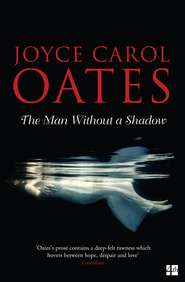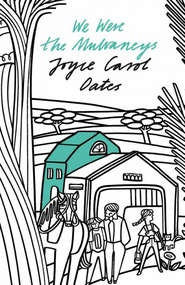По всем вопросам обращайтесь на: info@litportal.ru
(©) 2003-2025.
✖
Little Bird of Heaven
Автор
Год написания книги
2019
Настройки чтения
Размер шрифта
Высота строк
Поля
Steering the car through deep puddles of rainwater with one hand and with the other groping for my hand, capturing both my hands, clasping both hands together in his single hand, hard.
I tried not to wince. I loved such sudden pain!
I said, shyly, “Daddy, I missed you, too. I don’t know why Mom—”
“No ‘Mom,’ Krista. Not right now.”
Despite his unshaven jaws and slightly disheveled hair threaded with gray, my father was looking handsome, I thought. Even with his battered face, discolored pouches of skin beneath his eyes as if he hadn’t been sleeping well, or had been rubbing his fists into his eyes, and his forehead creased in thought or worry, Eddy Diehl was a handsome man. The suede coat he wore seemed to be padded with a woolly down like a large upright tongue—what comfort such a burly coat could give, if you were squeezed against it. And dark-graying hairs sprouting up from Daddy’s chest visible at his throat, what comfort in pressing my face against that throat, hiding my face there.
We’d ascended from the rain-pelted dark of Depot Street, the warehouse district, the scrubby waterfront of the Black River, now turning onto the Highlands Bridge that was a beautiful suspension bridge above the river with a wire-net surface that hummed beneath our car tires. A wild happiness was loosed inside the 1976 Caddie Seville with the cream-colored leather interior, Canyon Red finish and whitewall tires—“Fasten your seat belt! Taking off!” Daddy was laughing, of sheer delight, or defiance; I heard myself laugh, excited and uneasy.
Where was Daddy taking me? Across the suspension bridge, into a now lightly falling rain, mist rising from the invisible river below and a blurred vision of lights along the river, the dim stretch of derelict riverfront brick mills and factories shut down for as long as I could remember—Link Ladies Luxury Hosiery, Reynolds Bros. Paper Goods, Johnston Tomato Cannery.
These familiar Sparta landmarks I’d been seeing all my life long before the trouble had destroyed my family.
“—damned proud, Krista. Seeing my li’l girl mixing it up with those big hulking girls.”
Big hulking girls seemed to mean something other than its words. Big hulking girls contained something sexy, sniggering.
I asked Daddy how he’d known where I was? That I’d stayed after school, and was in the gym? Daddy tapped the side of his nose saying, “Your old man has you on his radar, Krista. Better believe it.”
Was he drunk, I wondered. Growly-teasing voice, his words just perceptibly slurred.
And yet: there is no happiness like being fifteen years old and being driven by your (forbidden) father to a destination you can’t—yet—guess. Your handsome (forbidden) father so clearly exulting in your presence as in his possession of you as a thief might gloat over having made away with the most precious of valuables, and no one in pursuit.
I was thinking how no one else loved me like this. No one else would wish to possess me.
Years ago before my father had moved from Sparta, in that interregnum of confusion and nightmare when Edward Diehl was being “taken into police custody”—“released from police custody”—banished from our household but living with relatives locally, it would happen that, as if by accident, Daddy would turn up at places where Ben and I were: boarding the school bus after school, at the mall while our mother was shopping for groceries, riding our bicycles along the Huron Pike Road. I was thrilled to see Daddy waving at us but Ben stiffened and turned away.
Muttering under his breath Like some damn ghost haunting us. Wish he would die!
It was a nasty side of Ben, I’ve never forgiven him, the eager way he reported back to our mother: “Daddy was following us! Daddy waved at us!” My mother was terrified—or wished to declare that she was terrified—that my father might “kidnap” us, such incidents left her semihysterical with indecision. Should she call the police, should she call my father’s family, should she try to ignore Eddy Diehl’s “harassment” or—what should would a responsible mother do?
No one knew. Many opinions were offered but no one knew. If you believed that Edward Diehl might have murdered—“strangled in her bed”—a Sparta woman who’d been his “mistress”—yes, “mistress” was the very term, boldly printed in local papers and pronounced on local radio and TV—you would naturally think that Edward Diehl should be forbidden to approach his children; if you believed that Edward Diehl was an innocent man, in fact a “good and loving” father to those children, you naturally felt otherwise.
A family splits apart just once, all that you learn will be for the first time.
“…but if you want to hold your own with tough girls like that, sweetie, you need to be more aggressive. You aren’t actually the shortest girl I saw on the court but you’re the least ‘developed’—I mean that muscularly—and you need to be meaner, and to take more chances. A good athlete isn’t thinking of herself but the team. If you’re cautious thinking you might be hurt—‘cause you can always be hurt, for sure, in any sport—you’ll be a deficit not an asset to your teammates.”
Deficit. Asset. In my father’s voice was an echo of a long-ago high school coach.
I was hurt, Daddy was criticizing me! Daddy was not praising me as I’d expected he would.
“I was watching those girls. Three or four of them are pretty impressive for their age. The one with the black hair shaved up the sides like a guy, must be a Seneca Indian?—yes?—the way she was ducking, using her elbows, twisting in midair tossing the basket—she’s dynamite. You can tell she’s been playing with guys, out there on the rez. And that big busty gal, with the peroxide streaks, the way she got the ball from you, just whipped it out of your hands. And that six-foot girl who almost trampled you, straight black hair and face like a hatchet—”
“Dolores Stillwater.”
“She’s Indian, right? From the rez?”
Why are we talking about these girls! Why aren’t we talking about me!
“If you want athletes like that to take you seriously, Krissie, you’ll have to work a little harder. Not just shooting baskets—from a stationary position, that isn’t hard. But on the run, playing defensively, holding your own, showing them you’re willing to hurt them—foul them—if those little bitches get in your way. An athlete has to make a decision, early on—Coach told us, in junior high—‘Either it’s you, or it’s them.’ Either you spare yourself the risk, and they take the risk—or you take it, and run right over them. A player who gets fouled all the time isn’t worth crap. If you don’t want to take the risk, Puss, maybe you shouldn’t be playing any sport at all.”
I was remembering: how like our father this was. Ben’s father, and mine. You thought you might be praised for something—anyway, not found lacking—but somehow, as Daddy pondered the subject, turning it this way and that in his thoughts as we’d see him turn a defective work tool in his fingers—it wasn’t praise that was deserved after all but a harsh but honest critique.
In his work, Daddy was something of a perfectionist: his shrewd professional eye picked up mistakes invisible to other eyes. So Daddy once tore out tile in our kitchen floor he’d laid laboriously himself, cursing and red-faced he ripped out wallpaper over which he’d toiled for hours in summer heat, he repainted walls because the shade of paint he’d chosen “wasn’t right” and it was “driving him crazy”; he’d built a redwood deck at the rear of our house to which he was always adding features, or subtracting features; on our property, work was “never done”—there was “always something to fix up”; but it was dangerous to offer to help Daddy, for Daddy’s standards were high, and Daddy was inclined to be impatient snatching away from my brother’s fumbling fingers a hammer, a screwdriver, an electric sander—when, years ago, poor Ben was eager to be Daddy’s apprentice carpenter around the house.
Fucking up was what Eddy Diehl hated. Fucking up—his own mistakes, or others’ mistakes—drove him crazy.
If you’d known my parents socially—not intimately—you’d have assumed that my mother might be difficult to please, and Eddy Diehl with his feckless smile and easy demeanor the one to let things go as they would, but in fact my father was the one whom any kind of fuckup enraged for it was a sign of a man losing control of his surroundings. In the confrontation of a fuckup anywhere in our vicinity my mother Lucille became alarmed and frightened, anxious how my father would react.
Not until the time of the court order banishing Eddy Diehl from our property and our lives would I learn the extent to which my mother was terrified of my father’s quick, hot, “blind” temper.
Maybe I should give up basketball?—sulkily I asked my father.
My heart that had been swollen with elation, pride, wanting-to-impress Daddy was now shriveled as a prune.
Steering the Caddie Seville onto an exit ramp, frowning and squinting through the rain-splotched windshield, my father seemed not to have heard me at first; then he said, more tenderly, “I didn’t say that, Krissie. Hell no. You’re learning. You’re promising. Sports is all about who you’re contending with, see? Like life, maybe. You’re only as good as your opponents let you be. They’re only as good as you let them be.”
This was so. Uncontestably, this was so. Now I had an idea of what my father might be feeling, his opponents thwarting him, blocking him, trampling on his life. And I had a sharper memory of how when we’d all lived together in the house on Huron Pike Road the very air reverberated with the swelling and shrinking, the waning and waxing of my father’s mood.
“Baby, no. You don’t ever give up.”
Daddy wasn’t staying with relatives or friends here in Sparta but, surprising to me, in the Days Inn on route 31. Maybe there was a reason for this, he’d explained. He was going to be “in the vicinity” until the following Monday—“seeing people”—“doing some business”—“tying up loose ends.” I hoped that this didn’t include trying to see my mother or any of her family. None of the Bauers wanted to see Eddy Diehl, ever again.
Your father is not welcome with us.
Your father is dead to us.
Some of my father’s business in Sparta had to do with “litigation”—he’d been trying for years, with one lawyer or another, to sue local law enforcement officers and the Herkimer County prosecutor’s office on grounds of harassment, character assassination, criminal slander and misuse of authority. So far as anyone knew, nothing had come of my father’s lawsuits except legal fees.
I dreaded to hear that he might be seeing yet another lawyer. Or that he might be planning on speaking again with the police, the prosecutors, the local newspapers and media. Demanding that his name be cleared.
Whatever my father’s specific business in Sparta, I knew better than to ask about it. For though Daddy seemed always to be speaking openly and frankly and in a tone of belligerent optimism you could not speak like this to him, in turn. I’d come to recognize a certain mode of adult speech that, seeming intimate, is a way of precluding intimacy. I am telling you all that you need to know! What I don’t tell you, you will not be told.
We’d exited the eerily humming suspension bridge from downtown Sparta to East Sparta, a no-man’s-land of small factories, gas stations, vacated warehouses, acres of asphalt parking lots creased and cracked and overgrown with gigantic thistles. In litter-strewn fields, in trash-choked gutters you saw lifeless bodies—you saw what appeared to be bodies—trussed and wrapped in twine, humanoid, part-decomposed. You saw, and looked again: only just garbage bags, more trash. East Sparta had lost most of its industries, now East Sparta was filling up with debris.
I asked my father where was he living now?—and my father said, “Me? Living now?” meant to be a joke and so I laughed nervously.
Maybe he wanted me to guess? I guessed Buffalo, Batavia, Port Oriskany, Strykersville…He said, “I’m between habitats, right now. Left some things in storage in Buffalo. Mostly I’m in motion, y’know?—in this car that’s my newest purchase/investment. Like it?”
Though I was listening intently to my father yet I seemed not to know what he was asking me. This car? Do I like—this car?
I had already told my father yes, I liked this car. This was a beautiful car. But he wasn’t living in his car, was he? Was he living in his car?
The backseat was piled with things. Boxes, files, folders. A pair of men’s shoes, what appeared to be clothing: outer garments. Suitcase. Suitcases. Duffel bag. More boxes.
Dead to us. Doesn’t he know it?











